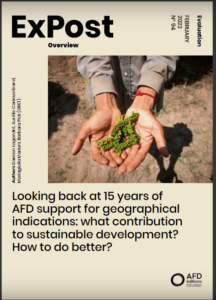 Since 2002, the “Agence Française de Développement” (AFD) has been supporting the development of Geographical Indications (GIs) in the countries where it operates.
Since 2002, the “Agence Française de Développement” (AFD) has been supporting the development of Geographical Indications (GIs) in the countries where it operates.
As part of France’s priorities for Aid for trade within the framework of the World Trade Organization (WTO), and more specifically through the French Trade Capacity Building Programme, AFD has historically structured its operations around 2 main areas: (i) institutional strengthening and (ii) support for pilot supply chains / GIs.
Over the period 2003-2020, AFD financed 13 GI projects for a total of €24 million in Southeast Asia, Africa, the Middle East, the Balkans, Cuba and Sri Lanka, and contributed to several regional projects.
In 2021-2022, AFD decided to carry out an evaluation of its portfolio of GI projects. Conducted by GRET, the aim of the evaluation was to assess whether and how AFD’s operations have achieved their objectives and what impact they have had, particularly in terms of sustainable development, in order to capitalize on lessons learned for future operations in this area.
Overall, the evaluation recognizes that the institutional objectives of the projects are highly relevant. They are in line with the international commitments of the beneficiary countries, with intellectual property laws and with national export promotion and poverty reduction strategies. The laws, strategies and implementing decrees supported by AFD are implemented in a long lasting manner.
On the other hand, the evaluation notes that, while strengthening quality chains seems relevant in terms of contributing to achieving the Sustainable Development Goals (SDGs), GIs are not necessarily the most appropriate tool for producers. Projects often focus on setting up GIs (characterization, identification, control systems, registration, etc.), and may divert attention away from the producers and groups’ priority needs (structuring, governance, quality improvement, opening up new markets, etc.). Projects generally lead to the official registration of GIs, but few have effectively resulted in the actual marketing of GI products, hence a limited impact on incomes. Impacts on biodiversity and the climate vary and depend intrinsically on the type of sectors being supported as well as on the product specifications that have been adopted. Lastly, while it is not possible to measure precisely the impacts on gender at this stage of the interventions, it appears that gender mainstreaming in the projects has improved significantly since the first GI projects.
In conclusion, the evaluators note that the choice of which GI commodity chain to support is key to ensure their maximum contribution to the achievement of the SDGs in developing countries. With regard to the best practices to be developed for AFD’s future operations, the evaluators recommend that specific actions be carried out very early on, in the project design stage and at the latest at the start of the project, in order to take better account of economic, environmental and social issues. In fact, the impacts of future GIs must be foreseen at the stage of selecting sectors. In this respect, the GI Facility, established by AFD in 2021 to provide technical and financial support for the development of GIs in the African, Caribbean and Pacific States, pays particular attention to social and environmental issues in the selection process of the projects it finances. In all cases, the choice of the quality scheme must be made by stakeholders, grouped together in a collective body. Their full adhesion to the collective strategy is essential so that they take ownership of the initiatives and is key to ensure that these are sustainable. The product specifications are also an important lever for directing the effects of GIs on sustainable development, both from the perspective of controlling risks and optimising possible positive impacts.
Lastly, the evaluators call on AFD and donors in general to stress the importance of funding projects covering the post-registration phase. This support is essential for GI associations, especially the weakest ones, to ensure that control plans are effectively implemented and that GI products have access to markets.
The publication is available here: LOOKING BACK AT 15 YEARS OF AFD SUPPORT FOR GEOGRAPHICAL INDICATIONS: WHAT CONTRIBUTION TO SUSTAINABLE DEVELOPMENT? HOW TO DO BETTER?


